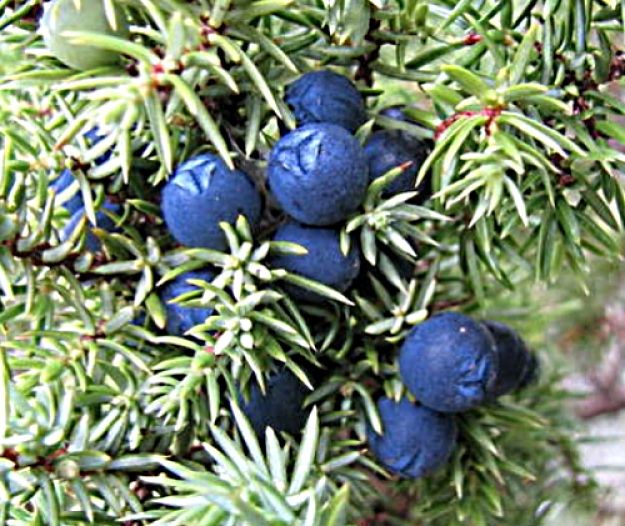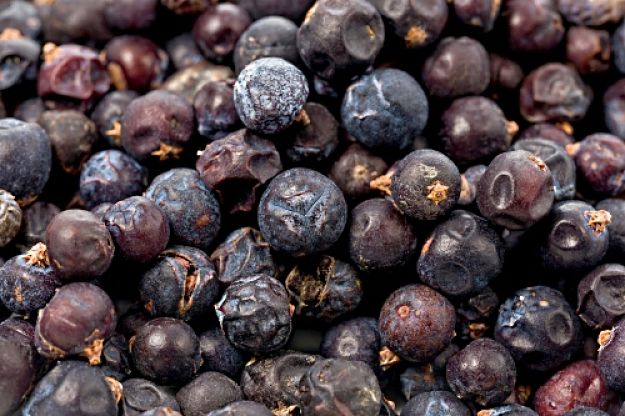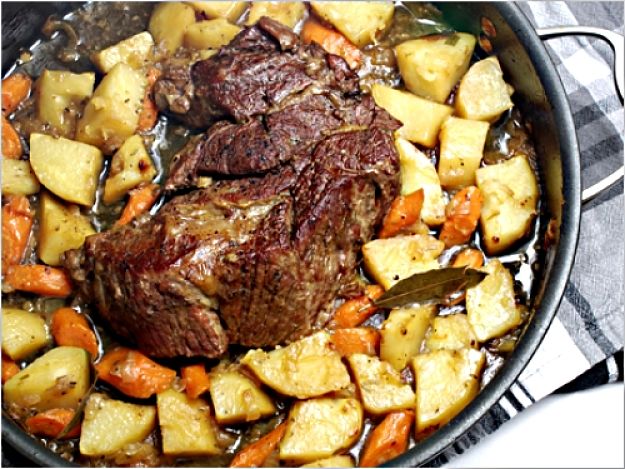Q&A Juniper Berries - Benefits for Health Nutrition Facts, Cooking Uses
Juniper berries, are not berries as such, but are the female seed cone of the fruit of various species of juniper trees found in Europe. The strong flavored berries are primarily used as a spice, providing a unique flavor food. The berries can be used as a spice, fresh when they have the most flavor or dried. The berries are blue, purple, violet or blackish-brown in color. Juniper is well known as a flavor for game meat and other meat and veal dishes and as a flavor for sauces. The extract from juniper berries has an antioxidant activity and the berries are used as a traditional medicine as well as a flavoring. Ancient Greeks, Egyptians, Arabs and Native American Indians used juniper berries to treat numerous diseases and to provide health benefits.
What are the Nutritional Facts for Juniper Berries?
Juniper berries contain volatile oils, vitamins, proteins, natural fiber and fatty acids, and they are a rich source of vitamins, minerals and other nutrients.
Macro-Nutrients - Percentage Composition
- 4% Protein
- 16% Fat
- 46% Carbohydrate
- 34% Vegetable Fiber
Vitamins, Minerals and Antioxidants
Juniper berries contain volatile oils and an odor resembling turpentine. It is these oil that give the berries their bitter taste.
Juniper berries are rich in vitamin C and Vitamin B (B-1, B-2, B-3).
They contain small amounts of calcium, magnesium, potassium, chromium, selenium and zinc.
Juniper also contains a variety of phytochemicals, including camphor, glycolic acid, beta-carotene, terpinen-4-ol, tannins and catechins. These compounds have strong antioxidant properties by helping the body deal with free radicals and so reduce the risk of many disease in humans triggered by free radicals. Juniper berries are a rich source of other antioxidants as well.
Juniper berries also have renowned antiviral and anti-inflammatory properties and are a traditional medicine in many culture. They do have side effects when too much is eaten. However they are generally used in very small quantities. For medicinal purposes the dose is about 1-5 drops of concentrated oil, or 20-100 mg of dried extract. Dried berries (2-10g) steeped in water and made into a tea is often used as a diuretic.
What are the Health Benefits of Juniper Berries?
Overall Juniper Berries are used for many digestion problems such as upset stomach, bloating and intestinal gas (flatulence), heartburn and general loss of appetite. Juniper is also used to treat minor gastrointestinal infections, urinary tract infections and to provide relief for kidney and bladder stones.
Juniper can be applied directly to the skin for treating minor wounds and to help relieve pain in the muscles and joints.
The essential oil extracted from juniper berries is also used to help relieve bronchitis and minor chest congestion.
In manufacturing, the juniper oil is used as a fragrance for cosmetics and soaps. The oil extract is also widely used in cosmetics such as lipstick, foundation cream, shampoos and hair conditioners, bubble bath oils and many other products.
Juniper berry extracts are used as an essential oil in aromatherapy.
Juniper berries are used to cleanse toxins from the blood and waste from the gut, and to treats and prevents urinary tract and bladder infections, cystitis and urethritis.
What are the Culinary Uses of Juniper Berries?
Juniper berries are mostly used as a spice, flavoring and a way of adding bitterness and intrigue to a dish. The outer scales of the berries are devoid of flavor. They are removed and the rest of the fruit is crushed to release the flavor, including the seeds. The aroma from the berries is best immediately after harvesting the fresh berries, but dried and powdered berries can be used as a substitute when fresh berries are unavailable.
Juniper Berries enhance the flavor of many meat dishes, particularly game dished. They also compliment the taste of beef, lamb and pork.
Discover the best time to grow berries, herbs and vegetables in your growing zone.
Serving Suggestions and How to Combine Juniper with other Ingredients
- Juniper and Cabbage
- Juniper and Cheese
- Juniper and Lemon
- Juniper and Sage
- Juniper and Orange
- Juniper and Pork
 By Jon Sullivan [Public domain], via Wikimedia Commons
By Jon Sullivan [Public domain], via Wikimedia Commons  John Tustin [CC-BY-SA-2.0], via Wikimedia Commons
John Tustin [CC-BY-SA-2.0], via Wikimedia Commons
